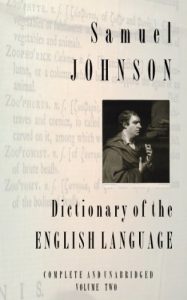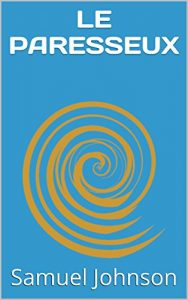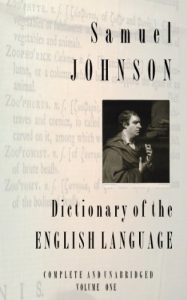Thackeray called Samuel Johnson, simply, “The Great Lexicographer”. What came to be known as “Johnson’s Dictionary” is both a masterpiece of world literature and a landmark in the history of the English language. This massive work set the standard for all future dictionaries of English, and no single writer other than Shakespeare has contributed more than Johnson to the development of the language. Jane Austen, Thomas Jefferson, Charles Darwin, Charles Dickens and Charlotte Brontë all used what was known for over a century as “the dictionary”, while Samuel Taylor Coleridge said he viewed with suspicion any man “who should speak of it without respect and gratitude”. Robert Browning read it “in its entirety” to “qualify” himself as a poet, and Samuel Beckett scoured it for obscure words – among those he found, and used, were “increpation”, “inosculation”, and “to snite”. Since its first publication, it has been indispensable to anyone who cares about our language and its literature. Informative, irreverent and funny, it is a joy for everyday readers and a browser’s paradise, as well as being an indispensable resource for historians and linguists.
By making this masterpiece available once more, the release of the Lexicos edition marks an event in ebook publishing. The only ebook edition of this great work, and the only unabridged edition currently in print in any format, it has been professionally edited (not OCR’d) and formatted for the Kindle. It is based on the 1773 edition, the final edition of the Dictionary expanded and revised by Johnson himself. It also incorporates those entries included in the original 1755 edition and cut out in 1773, along with Johnson’s original preface, and his “Plan of a Dictionary of the English Language,” written in 1747. Volume One covers letters A through K, Volume Two letters L through Z. Both volumes are fully searchable and have an active table of contents.
“The most important British cultural monument of the eighteenth century.” — Henry Hitchings, Defining the World: The Extraordinary Story of Dr Johnson’s Dictionary
“More than anything else he wrote, it was the dictionary that made Johnson’s reputation, and of all his accomplishments, it’s the dictionary that most suggests the true nature of Johnson’s genius.” — Charles McGrath, New York Times
“We would earnestly recommend it to all those who are desirous to improve and correct their language, frequently to consult the dictionary. Its merit must be determined by the frequent resort that is had to it. This is the most unerring test of its value: criticisms may be false, private judgments ill-founded; but if a work of this nature be much in use, it has received the sanction of the public approbation.” — Adam Smith, Edinburgh Review
By making this masterpiece available once more, the release of the Lexicos edition marks an event in ebook publishing. The only ebook edition of this great work, and the only unabridged edition currently in print in any format, it has been professionally edited (not OCR’d) and formatted for the Kindle. It is based on the 1773 edition, the final edition of the Dictionary expanded and revised by Johnson himself. It also incorporates those entries included in the original 1755 edition and cut out in 1773, along with Johnson’s original preface, and his “Plan of a Dictionary of the English Language,” written in 1747. Volume One covers letters A through K, Volume Two letters L through Z. Both volumes are fully searchable and have an active table of contents.
“The most important British cultural monument of the eighteenth century.” — Henry Hitchings, Defining the World: The Extraordinary Story of Dr Johnson’s Dictionary
“More than anything else he wrote, it was the dictionary that made Johnson’s reputation, and of all his accomplishments, it’s the dictionary that most suggests the true nature of Johnson’s genius.” — Charles McGrath, New York Times
“We would earnestly recommend it to all those who are desirous to improve and correct their language, frequently to consult the dictionary. Its merit must be determined by the frequent resort that is had to it. This is the most unerring test of its value: criticisms may be false, private judgments ill-founded; but if a work of this nature be much in use, it has received the sanction of the public approbation.” — Adam Smith, Edinburgh Review









